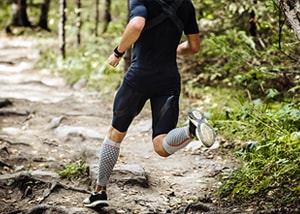
Compression gear is becoming more and more common among athletes, from NBA players to amateur runners. What are compression sleeves, socks, shirts and tights, and is there any evidence they do what manufacturers claim?
Athletic compression gear is very similar to the compression garments that have been used for decades in the medical field to improve symptoms related to diabetes, swelling and vein disorders. In fitness, compression gear is touted to help improve blood circulation, reduce blood lactate buildup, support the muscles, protect the skin, help maintain body temperature and reduce impact and pounding on muscles during exercise. It is also thought that compression sleeves or socks may help muscles recover more quickly after exercise.
Does compression clothing really work?
Studies on compression gear have found varied responses among athletes who use compression socks or sleeves. While some companies claim they can help improve performance, the true impact on athletic performance remains unclear. However, one study conducted in Germany found that runners who wore compression socks were able to run longer and faster during a treadmill test than runners who did not wear compression socks.
Another study noted that compression sleeves improved performance for endurance cycling by increasing concentration of oxygen in the muscles. Cyclists who wore compression sleeves also took longer to reach their anaerobic threshold than cyclists who did not. Research also suggests compression clothing can, in fact, aid muscle recovery and limit muscle soreness after a workout.
Who should wear compression clothing?
While compression gear may not be beneficial to all athletes, compression gear can be beneficial to athletes who may engage in explosive movement, including sprinting, leaping and jerking, according to a 2013 review of more than 30 studies.
There may also be a psychological factor at play—athletes who believe compression gear works may actually benefit from the tight-fitting clothing.
The verdict
It remains unclear whether or not compression clothing actually provides measurable benefits to athletes who wear them, but if you believe they work, don’t stop wearing them. “Since beliefs are strong performance enhancers, I would recommend compression clothing to persons who believe in the performance-enhancing effect,” said Billy Sperlich, professor of exercise science at University of Wurzburg in Germany and co-author of the review.





